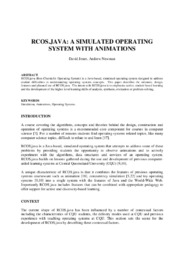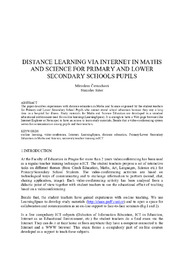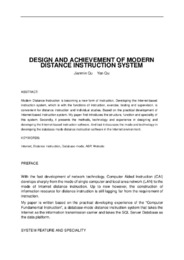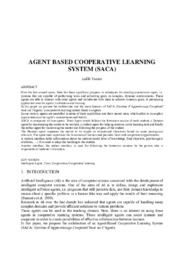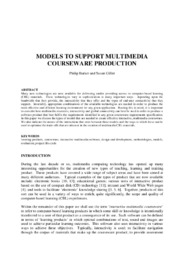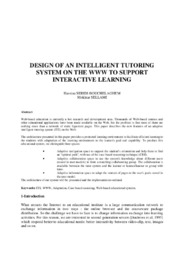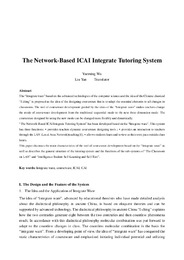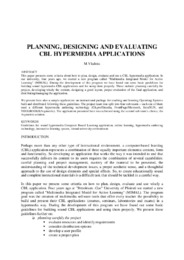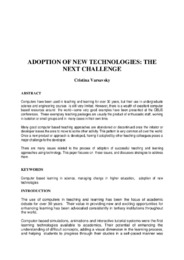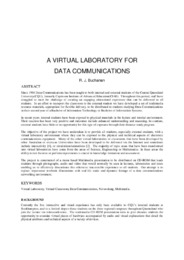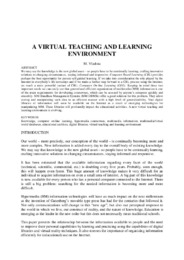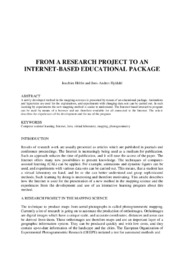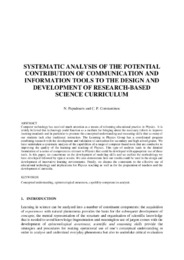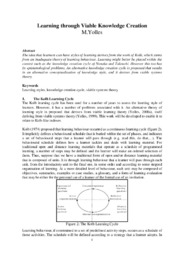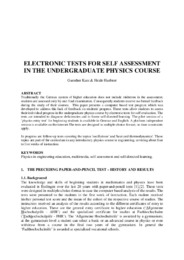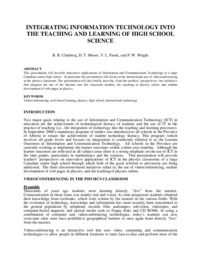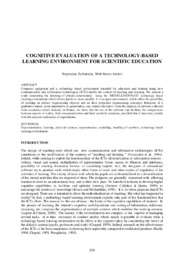Συνέδρια - Conferences: Recent submissions
Now showing items 41-60 of 502
-
Rcos.java: a simulated operating system with animations
(Pedagogical Faculty of University of Ostrava, 2001)RCOS.java (Ron Chernich's Operating System) is a Java-based, simulated operating system designed to address student difficulties in understanding operating systems concepts. This paper describes the rationale, design, features ... -
Distance learning via internet in maths And science for primary and lower secondary schools pupils
(Pedagogical Faculty of University of Ostrava, 2001)The paper describes experiences with distance education in Maths and Science organised by the student teachers for Primary and Lower Secondary School Pupils who cannot attend school education because they stay a long time ... -
Design and achievement of modern distance instruction system
(Pedagogical Faculty of University of Ostrava, 2001)Modern Distance Instruction is becoming a new form of instruction. Developing the Internet-based instruction system, which is with the functions of instruction, exercise, testing and supervision, is convenient for distance ... -
Postcourse - www-based course on Databases
(Pedagogical Faculty of University of Ostrava, 2001)The objective of this paper is to report the experience with further development and use of Postcourse a webbased course on databases. -
Agent based cooperative learning System (saca)
(Pedagogical Faculty of University of Ostrava, 2001)Over the last several years, there has been significant progress in techniques for creating autonomous agent, i.e. systems that are capable of performing tasks and achieving goals in complex, dynamic environments. These agents ... -
Models to support multimedia Courseware production
(Pedagogical Faculty of University of Ostrava, 2001)Many new technologies are now available for delivering and/or providing access to computer-based learning (CBL) materials. These technologies vary in sophistication in many important ways - depending upon the bandwidth ... -
Design of an intelligent tutoring system on the www to support Interactive learning
(Pedagogical Faculty of University of Ostrava, 2001)Web-based education is currently a hot research and development area. Thousands of Web-based courses and other educational applications have been made available on the Web, but the problem is that most of them are nothing ... -
The network-based ICAI integrate tutoring system
(Pedagogical Faculty of University of Ostrava, 2001)The “Integrate ware” based on the advanced technologies of the computer science and the idea of the Chinese classical “I ching” is proposed as the idea of the designing courseware that is to adapt the essential elements ... -
Planning, designing and evaluating CBL hypermedia applications
(Pedagogical Faculty of University of Ostrava, 2001)This paper presents some criteria about how to plan, design, evaluate and use a CBL hypermedia application. In our university, four years ago, we started a new program called "Multimedia Integrated Model for Active Learning" ... -
Adoption of new technologies: the next challenge
(Pedagogical Faculty of University of Ostrava, 2001)Computers have been used in teaching and learning for over 30 years, but their use in undergraduate science and engineering courses is still very limited. However, there is a wealth of excellent computer based resources ... -
A virtual laboratory for data communications
(Pedagogical Faculty of University of Ostrava, 2001)University(CQU), formerly Capricorn Institute of Advanced Education(CIAE). Throughout this period, staff have struggled to meet the challenge of creating an engaging educational experience that can be delivered to all students. ... -
A virtual teaching and learning Environment
(Pedagogical Faculty of University of Ostrava, 2001)We may say the knowledge is the new global asset – so people have to be continually learning, crafting innovative solutions to changing circumstances, staying informed and responsive. Computer Based Learning (CBL) ... -
From a research project to an internet-based educational package
(Pedagogical Faculty of University of Ostrava, 2001)A newly developed method in the mapping sciences is presented by means of an educational package. Animations and hypertexts are used for the explanations, and experiments with changing data sets can be carried out. In ... -
New interactive decision games implemented in dega environment
(Pedagogical Faculty of University of Ostrava, 2001)Interactive decision games are specifically designed to simulate options and issues of the uncertainty and complexity involved in decision making. Games are used in a PBL (problem based learning) situations, where students ... -
Systematic analysis of the potential contribution of communication and information tools to the design and development of research-based science curriculum
(Pedagogical Faculty of University of Ostrava, 2001)Computer technology has received much attention as a means of reforming educational practice in Physics. It is widely believed that technology could function as a medium for bringing about the necessary reform to ... -
Learning through viable knowledge creation
(Pedagogical Faculty of University of Ostrava, 2001)The idea that learners can have styles of learning derives from the work of Kolb, which stems from an inadequate theory of learning behaviour. Learning might better be placed within the context such as the knowledge creation ... -
Designing applets that foster constructivist teaching and learning
(Pedagogical Faculty of University of Ostrava, 2001)The Modular Approach to Physics (MAP) project makes extensive use of “educational objects” which include Flash animations, Java Applets and Java Applications. A paramount concern in the design of these objects has been to ... -
Electronic tests for self assessment in the undergraduate physics course
(Pedagogical Faculty of University of Ostrava, 2001)Traditionally the German system of higher education does not include midterms in the assessment; students are assessed only by one final examination. Consequently students receive no formal feedback during the study of ... -
Integrating information technology into the teaching and learning of high school science
(Pedagogical Faculty of University of Ostrava, 2001)This presentation will describe innovative applications of Information and Communication Technology in a large Canadian senior high school. In particular the presentation will focus on the instructional use of videoconferencing in ... -
Cognitive evaluation of a technology-based learning environment for scientific education
(Department of Educational Sciences, University of Cyprus, 2003)Computer equipment and a technology based environment intended for education and training using new communication and information technologies (ICTs) mofify the context of teaching and learning. We present a study concerning ...
